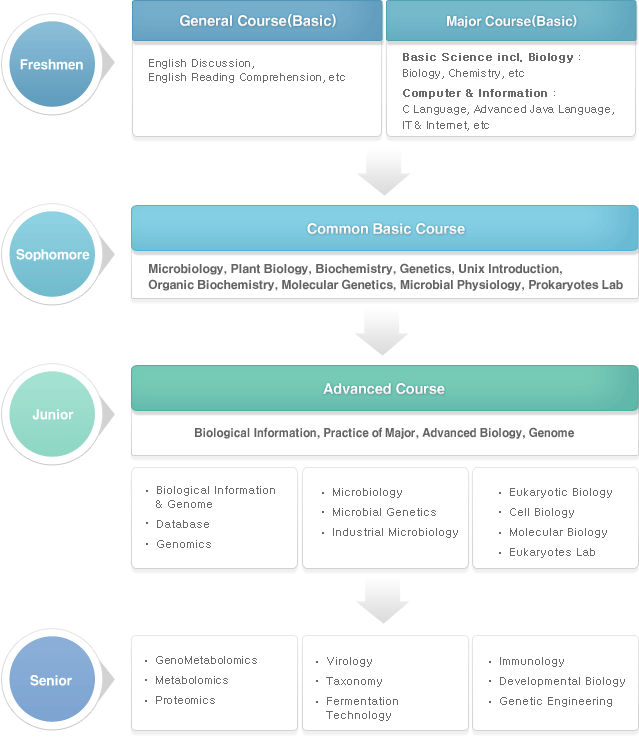Department of Biosciences and Bioinformatics
It aims to foster faithful and competent people who lead the environment and pursue.The dignity of life through the exploration of life phenomena.
| Tel | 031-330-6152 |
|---|---|
| Fax | - |
| Location | Engineering Bldg.2 3F |

Introduction and Characteristics
The Department of Biosciences and Bioinformatics seeks to foster talents who have the professional skills to lead academic and technological advances in the Biosciences and fields and have the passion for the scientific understanding of life phenomena and their popularization. Through systematic theory and experimental study of the Department of Biosciences and Bioinformatics, students will be able to participate in the development of basic Biosciences and related applications. Practically, students are trained to be able to design engineering value creation strategies and jobs based on biosciences principles.
As the foundations of biotechnology that leads the 21st century, biosciences are the fastest growing field of science. Biosciences and Informatics, commonly referred to as Bioinformatics, is a discipline that attempts to solve bioscientific problems using information science and computer science. It can be understood as IT / BT convergence science. Our department education emphasizes systematic understanding of genetic information and provides education on analysis and management of genetic information using computer technology in advanced courses. As computer culture develops, it is possible to become a bioinformatics major just by utilizing software. Of course, you need a foundational knowledge of Biosciences.
In order to achieve these educational goals, we offer common major courses and detailed major courses and provide seminars and thesis research to help students understand the development of modern biosciences and acquire comprehensive application skills. It is possible for juniors and seniors to have the opportunity to conduct further research in the faculty lab
Through utilizing basic knowledge of biosciences informatics, graduates are able to advance to a food and pharmaceutical company or perform quality control in the biological or chemical industry, and if they continue on to complete a graduate course, they become a researcher in biotechnology. In addition, graduates can choose from a variety of careers, including national and public research institutes, university-affiliated research institutes (government-supported research centers, etc.), hospital-medical university laboratories, and biosciences educational institutions
Mission Statement
The mission of Department Biosciences and Informatics is to love each other for home, society and community under MJU’s foundation spirit, Christian love. It is to also to foster competent talents to pursue values of life’s dignity through vital phenomenon and keep social persons who can take the lead in protection of environment and try to develop biotechnology industry. We establish following Mission Statement, through realizing the educational purpose of Myongji University and reflecting university and academic characteristics.
- 1To foster professionals in the fields of biotechnology and bioinformatics
- 2To foster practical human resources required for biotechnology industry
- 3To foster the human resources of Biosciences, equipped with informal and international ability
- 4To foster sincere social members who pursue life’s dignity and be in the forefront of environmental conservation
History
| 2016.03. | Reformed to Department of Biosciences and Informatics form Department of Bioscience & Bioinformatics |
|---|---|
| 2005.03. | Selected in 2nd phrase of BK21 Project from Ministry of Education & Human Resources Development(Scientific Technology-Applied Biotechnology; 2006-2012) |
| 2003.03. | Department Supported for Long Term Developing Plan in MJU |
| 2002.03. | Reform from department of Biotechnology to department of Bioscience & Bioinformatics (Majors of Bioscience, Bioinformatics) |
| 1999.09. | Selected as BK21 Project Groups in the field of Agricultural Biotechnology |
| 1996.03. | Establishment of department of Biotechnology with Graduate College (Doctor’s Degree) |
| 1995.05. | Opening of international computer network Myongji Bioserver |
| 1995.03. | Name Change to department of Biotechnology from department Biology |
| 1995.02. | Best Selection Department from Korean Council for University Education (KCUE), “Assessment of department Biology" |
| 1994.03. | Established Graduate School of Biology (Master's Degree) |
| 1994.03. | Establishment of department of Biology with Graduate College (Master’s Degree) |
| 1993.03. | Establishment of Major of Educational Biology within Graduate School |
| 1992.02. | 1st Graduation |
| 1988.03. | Establishment of department of Biology |
Major Process Model
Major Change and Transfer Admission Standard
| College | Department | Standard | Remarks |
|---|---|---|---|
| Natural Sciences | Biosciences and Informatics | Document Screening(50%), Interview(50%) |
Curriculum
| Year | Curriculum |
|---|---|
| Freshman | Biology1.2/ Biological Experiment1.2 |
| Sophomore | Genetics / Molecular Genetics / Botany / Microbiology1,2 / Biochemistry / Bioorganic Chemistry / Analytical Biology / Unix Introduction and Practice / Program Languages and Practices / Eukaryote Experiment1,2 |
| Junior | Cell Biology / Immunology / Molecular Biology1,2 / Evolutionary Systemology / Molecular Physiology /Plant Development Physiology / Plant Physiology / Biotechnology / Industrial Microbiology / Eukaryote Experiment 1,2 |
| Senior | Animal Physiology / Virology / Genetic Engineering / Medical Microbiology / Microbiology / Bioanalytical Chemistry / Genetic Informatics / Bioinformatics / Biosciences Research Methodology 1,2 |
| All Grades | Biosciences field Studies 1, 2 / Long-term field Studies |

